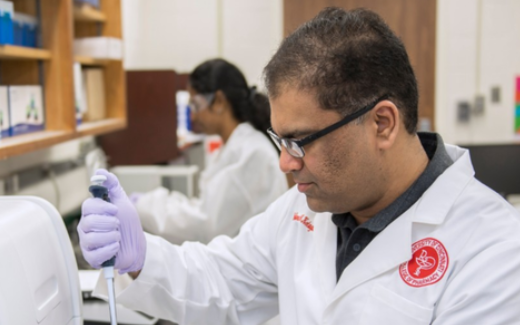America
Indian-origin researcher leads study of imaging technology to diagnose lung infections

New York, Aug 16
A study led by an Indian-origin researcher of University of Cincinnati looks to develop a new imaging technique that can identify certain types of lung infections in order to speed up treatment for critically ill patients.
According to Nalinikanth Kotagiri, an associate professor of pharmaceutical sciences at the UC James L. Winkle College of Pharmacy, imaging has the potential to identify specific lung infections in real time -- instead of taking two to three days.
Kotagiri and his team will develop and study the effectiveness of different kinds of injectable probes (metallic contrast agents) that would collect at the site of the infection and immediately light up under a nuclear imaging machine, known as a PET scan.
Currently, radiologists use chest X-rays to confirm the diagnosis of pneumonia and other infections in the lungs, which cannot determine the specifics of the infection or whether the infection is bacterial, viral or fungal.
A specific diagnosis can only be determined by a pathologist, after culturing a sample of lung tissue which is collected from an invasive procedure (called a bronchoscopy) and takes time, typically two-three days.
Critically ill patients, however, such as those with infectious pneumonia and underlying conditions such as chronic obstructive pulmonary disease (COPD), might not have time to spare, says Kotagiri.
"Our solution is to use imaging to identify what is causing the pneumatic episode," within hours, to hasten a treatment plan, he says.
An added benefit, says Kotagiri, is that the contrast agent development process "doesn’t require elaborate processing or preparation timeâ€.
This is critical as development of contrast agents can be time-consuming and complicated. A simple and fast process is expected to reduce preparation time in a clinical laboratory and potentially enable adoption of the technology in a clinical setting.
With this study in animal models, Kotagiri and team will only be looking at bacterial and viral pneumonias in conjunction with COPD, but the imaging approach has the potential to apply to other types of infections such as fungal infections or conditions such as cystic fibrosis.
According to Kotagiri, imaging the patient after treatment could also identify whether the patient is responding to medications such as antibiotics.
Imaging could also potentially aid in determining the right antibiotics to use, targeting the pathogens that were identified, he said.
For the study, Kotagiri has been awarded a five-year $3 million, R01 grant from the National Heart, Lung, and Blood Institute (NHLBI). The R01, or Research Project Grant, provides support for health-related research and development based on the mission of the National Institutes of Health.

23 seconds ago
Adani Group’s solid asset base anchors cash flow, credit profile of USD bonds: BofA

13 hours ago
Aware of Delhi explosion, closely monitoring the situation: US State Department

15 hours ago
Red Fort blast: Death toll reaches 10; security tightens at RSS HQs in Nagpur

16 hours ago
Red Fort blast: Leaders express condolences to the affected families

16 hours ago
Delhi: 8 killed, dozen injured in car explosion near Red Fort; high alert in Maha, UP

17 hours ago
With US sanctions waiver, India to continue operations at Chabahar port, facilitating trade for countries like Afghanistan

17 hours ago
GOPIO International Engages with Former Minister Smt. Meenakshi Lekhi

17 hours ago
AAPI, American Academy of Yoga and Medicine, and India’s Ministry of AYUSH to Host Groundbreaking Conference on Integrative Health in Memphis, TN

17 hours ago
US Senate votes to end shutdown, paving way for government reopening

17 hours ago
US lawmakers move to halt China's toxic vape invasion threatening American youth

18 hours ago
Gov. Greg Abbott Announces Fourth-Term Bid at Houston Event

21 hours ago
"People that are against tariffs are fools": Trump says at least $2,000 dividend a person coming for Americans

22 hours ago
Explosive claims rock Dhaka; Ex-Minister points finger at US Aid giant, Clintons in Hasina's downfall






















